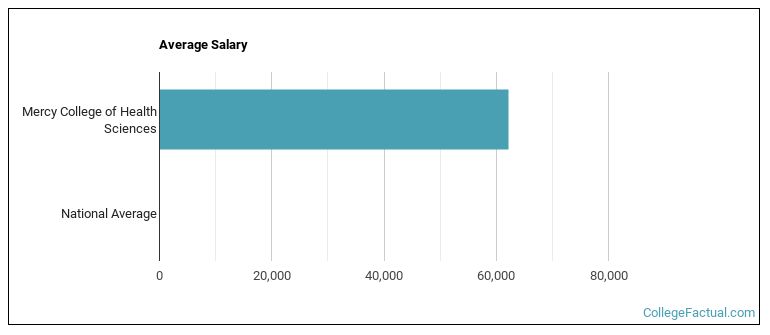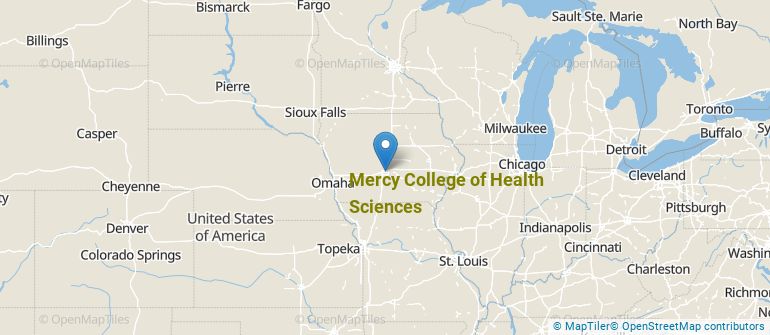 by our College Data Analytics Team
by our College Data Analytics TeamCollege Factual recognizes the best colleges and universities in its annual rankings. These rankings include categories for best overall colleges, best colleges for each major, best value schools, and much more.
Mercy College of Health Sciences was awarded 2 badges in the 2025 rankings. The highest ranked major at the school is allied health professions.
Explore the best ranked schools for the programs you are most interested in.
Mercy College of Health Sciences was not ranked in College Factual's 2025 Best Overall Colleges report. This could be for a number of reasons, including lack of data.
See all of the rankings for Mercy College of Health Sciences.
Mercy College of Health Sciences has an acceptance rate of 97%, so it is easier to gain admission to this school than some others. Still, the admissions staff will examine your application closely to make sure you're a good fit for Mercy College of Health Sciences.
Mercy College of Health Sciences received ACT scores from 3% of accepted students.
Learn more about Mercy College of Health Sciences admissions.
The student to faculty ratio is often used to measure the number of teaching resources that a college or university offers its students. The national average for this metric is 15 to 1, but at Mercy College of Health Sciences it is much better at 8 to 1. That's good news for students who want to interact more on a personal level with their teachers.
In addition to the student to faculty ratio, some people look at what percentage of faculty members are full-time as a sign of how much time professors will be able to spend with their students. This is because part-time teachers may not be be on campus as much as their full-time counterparts.
The full-time faculty percentage at Mercy College of Health Sciences is 39%. This is lower than the national average of 47%.
The freshmen retention rate tells us what percentage of first-year, full-time students choose to continue on to their sophomore year at a particular school. The rate at Mercy College of Health Sciences is 67%, which is about average when compared to the national rate of 68%.
The on-time graduation rate for someone pursuing a bachelor's degree is typically four years. This rate at Mercy College of Health Sciences for first-time, full-time students is 54%, which is better than the national average of 33.3%.
Find out more about the retention and graduation rates at Mercy College of Health Sciences.
During the 2017-2018 academic year, there were 869 undergraduates at Mercy College of Health Sciences with 516 being full-time and 353 being part-time.
| $0-30 K | $30K-48K | $48-75 | $75-110K | $110K + |
|---|---|---|---|---|
| $22,496 | $21,465 | $21,767 | $27,418 | $26,983 |
The net price is calculated by adding tuition, room, board and other costs and subtracting financial aid.Note that the net price is typically less than the published for a school. For more information on the sticker price of Mercy College of Health Sciences, see our tuition and fees and room and board pages.
Almost 66% of college students who graduated with the class of 2018 took out student loans, but that percentage varies from school to school. At Mercy College of Health Sciences, approximately 61% of students took out student loans averaging $8,191 a year. That adds up to $32,764 over four years for those students.
Get more details about paying for Mercy College of Health Sciences.

See which majors at Mercy College of Health Sciences make the most money.
Get more details about the location of Mercy College of Health Sciences.

Contact details for Mercy College of Health Sciences are given below.
| Contact Details | |
|---|---|
| Address: | 928 6Th Ave, Des Moines, IA 50309-1239 |
| Phone: | 515-643-3180 |
| Website: | https://www.mchs.edu/ |
| Most Popular Majors | Bachelor’s Degrees | Average Salary of Graduates |
|---|---|---|
| Nursing | 294 | $66,309 |
| Allied Health Professions | 54 | NA |
| Allied Health & Medical Assisting Services | 30 | NA |
| Health & Medical Administrative Services | 11 | NA |
| Clinical/Medical Laboratory Science | 10 | NA |
| Health/Medical Prep Programs | 3 | NA |
| Public Health | 2 | NA |
Online learning options are becoming more and more popular at American colleges and universities. Online classes are great for students who have busy schedules or for those who just want to study on their own time.
In 2022-2023, 723 students took at least one online class at Mercy College of Health Sciences. This is a decrease from the 773 students who took online classes the previous year.
| Year | Took at Least One Online Class | Took All Classes Online |
|---|---|---|
| 2022-2023 | 723 | 217 |
| 2021-2022 | 773 | 182 |
| 2020-2021 | 704 | 210 |
| 2018-2019 | 406 | 62 |
Learn more about online learning at Mercy College of Health Sciences.
Footnotes
*The racial-ethnic minorities count is calculated by taking the total number of students and subtracting white students, international students, and students whose race/ethnicity was unknown. This number is then divided by the total number of students at the school to obtain the racial-ethnic minorities percentage.
References
More about our data sources and methodologies.